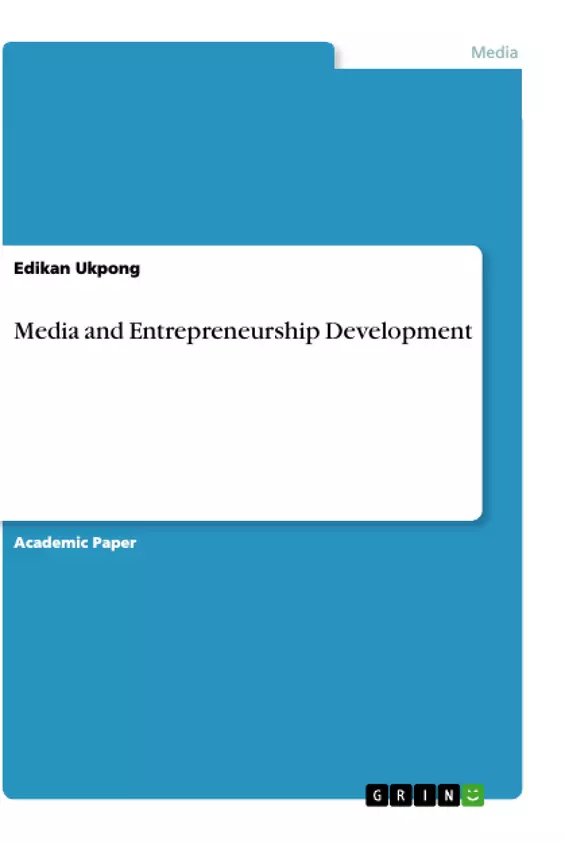The prevailing economic scenario in Nigeria, of a truth, has led the present government in Nigeria to look at means of diversifying the economy. With this, it has become imperative to think of incorporating various entrepreneurial options in actuality as well as introducing new entrepreneurial options into the already existing economic system as a mechanism of sustenance and a survival kit to keep afloat amidst this economic depreciation. Furthermore, Olayinka and Olaoluwa bring this problem to a practical pinpoint by illustrating that "the present government has been advocating for the incorporation of entrepreneurship studies into the syllabus of all our higher institutions of learning"; with the aims to sensitise the entire citizens of Nigeria about the importance and advantages of being self-reliant instead of searching for white-collar jobs (also referred to as salary jobs), which are not always readily available.
Inhaltsverzeichnis (Table of Contents)
- CHAPTER ONE: INTRODUCTION.
- 1.1 Background to the Study.
- 1.2 Objectives of the Study
- 1.3 Research Questions.
- 1.4 Significance of the Study
- 1.5 Scope of the Study..
- 1.6 Limitation of the Study
- 1.7 Operational Definition of Terms ........
- CHAPTER TWO: LITERATURE REVIEW.
- 2.0. Introduction.
- 2.1. Review of Concepts.
- 2.2 Review of Related Theoretical Literature
- 2.3 Review of Related Empirical Studies...
- 2.4 Theoretical Framework
- CHAPTER THREE: METHODOLOGY
- 3.0 Introduction........
- 3.1 Research Design............
- 3.2 Population of the Study.
- 3.3 Sampling and Sample Size....
- 3.4 Sampling Technique
- 3.5 Instrument for Data Collection
- 3.6 Technique(s) of Data Collection..
- 3.7 Method of Data Analysis
- CHAPTER FOUR: DATA PRESENTATION, ANALYSIS AND DISCUSSION OF FINDINGS..
- 4.0 Introduction
- 4.1 Data Presentation and Analysis
- 4.2 Answering Research Questions and Discussion of Findings .
Zielsetzung und Themenschwerpunkte (Objectives and Key Themes)
This study aims to explore the potential of radio as a tool for promoting entrepreneurial development in Nigeria. The study is motivated by the high levels of unemployment in the country, particularly among young people, and the government's efforts to diversify the economy and encourage self-reliance. The research specifically focuses on the Akwa Ibom Employment and Enterprise Scheme (AKEES), a government-led initiative designed to empower unemployed youth through vocational skills training and entrepreneurial development. The study examines the role of radio in promoting entrepreneurial awareness, fostering entrepreneurial skills, and supporting the success of entrepreneurship programs. It seeks to identify how radio can be used to effectively communicate entrepreneurial information, inspire potential entrepreneurs, and address challenges related to entrepreneurial development in the Nigerian context.
- The impact of youth unemployment on Nigerian society and the economy.
- The role of entrepreneurship in diversifying the Nigerian economy and addressing unemployment challenges.
- The potential of radio as a communication medium for promoting entrepreneurship.
- The effectiveness of government-led entrepreneurial development programs in Nigeria.
- Strategies for utilizing radio to encourage entrepreneurial participation and support entrepreneurs.
Zusammenfassung der Kapitel (Chapter Summaries)
- Chapter One: Introduction. This chapter provides an overview of the study's background, objectives, research questions, significance, scope, limitations, and operational definitions of key terms. It highlights the challenge of youth unemployment in Nigeria, the government's efforts to promote entrepreneurship, and the rationale for exploring the potential of radio as a tool for entrepreneurial development.
- Chapter Two: Literature Review. This chapter presents a comprehensive review of relevant literature on entrepreneurship, youth unemployment, and the role of media in promoting entrepreneurial development. It examines existing theoretical frameworks and empirical studies related to the subject, laying the foundation for the study's theoretical framework.
- Chapter Three: Methodology. This chapter details the research design, population of the study, sampling techniques, instruments for data collection, data collection methods, and data analysis techniques used in the study. It provides a clear explanation of the methods employed to collect and analyze data related to the study's objectives.
- Chapter Four: Data Presentation, Analysis and Discussion of Findings. This chapter presents and analyzes the data collected through the study, addressing the research questions and exploring the key themes identified. The findings of the study are discussed in detail, providing insights into the role of radio in promoting entrepreneurship in Nigeria.
Schlüsselwörter (Keywords)
The study focuses on key concepts such as entrepreneurship, youth unemployment, radio, media, communication, entrepreneurial development, government programs, skills training, and economic development. The research explores the potential of radio to address the challenges of youth unemployment and promote entrepreneurial activity in Nigeria.
Frequently Asked Questions
What is the role of radio in entrepreneurship development in Nigeria?
Radio serves as a vital communication medium to sensitize citizens about self-reliance, promote vocational skills, and support government initiatives like AKEES.
What is the Akwa Ibom Employment and Enterprise Scheme (AKEES)?
AKEES is a government-led program in Nigeria designed to empower unemployed youth through vocational training and entrepreneurial support to reduce reliance on "white-collar" jobs.
Why is economic diversification imperative for Nigeria?
Due to economic depreciation and high youth unemployment, the government aims to move away from a mono-product economy by fostering entrepreneurship across various sectors.
How does the media influence youth participation in entrepreneurship?
Media, especially radio, can inspire potential entrepreneurs, provide information on available programs, and address social challenges related to unemployment.
What are the main objectives of entrepreneurship studies in higher education?
The goal is to equip students with the mindset and skills to be self-employed rather than waiting for scarce salary-based jobs after graduation.
- Quote paper
- Edikan Ukpong (Author), 2016, Media and Entrepreneurship Development, Munich, GRIN Verlag, https://www.hausarbeiten.de/document/512233


